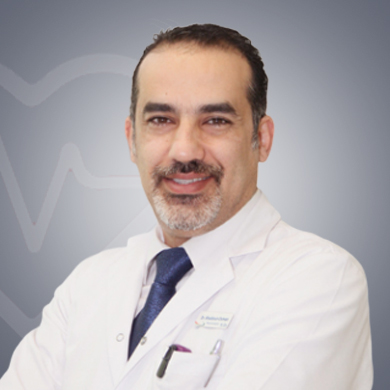
10 Years of experience
Speaks: English
Dr. Khaldoun Osman has more than 9 years of experience as a specialist neurosurgeon (spinal microsurgery). He went onto complete his German Board in Microsurgery (Facharzt) from the Diakonie Klinikum Gmbh Jung Stilling Hospital. Apart from this, Dr. Osman has Syrina Board in Neurosurgery and is also a Member of the German Society of Neurosurgeon (DGNC).
Dr. Khaldoun Osman has a keen interest in minimally invasive microsurgery of the spine, kyphoplasty vertebroplasty for a spinal fracture, brain tumours, hydrocephalus, neurosurgical trauma, peripheral nerve lesions, and management of pain. He started off his career by working with the Klinikum Badhersfeld Hospital, Germany. Dr. Osman has worked with several international and national hospitals to gain exposure as a neurosurgeon. Before jumping to any conclusion’s Dr. Osman discusses the entire case history along with the reports with his patient. Only after a thorough word and an analysis of the case history, Dr. Osman takes the most vital decision is whether to perform a surgery or not. Moreover, Dr Khaldoun handles his patients with utmost care and responsibility. His main goal as a doctor is to serve his patients until they are totally fit.
Neurosurgeons are trained to treat people suffering aneurysms, blocked arteries, trauma to the brain and spine, birth defects, chronic low-back pain, brain and spinal cord cancer, and peripheral nerve problems. Neurosurgeons also do surgeries for carpal tunnel syndrome, spinal surgery, and brain tumor removal surgery. Here is a list of some of the conditions Dr. Khaldoun Osman treats:
Some of the signs and symptoms of neurological disorders are listed below. Consult your doctor/neurosurgeons if you experience any of these symptoms. Early detection of the condition can help control the severity of the symptoms and can be effectively treated. The below symptoms should be discussed with a neurosurgeon who will advise required diagnostic tests and start appropriate treatment.
When the brain is damaged, it affects different things, including memory, sensation, and even an individual’s personality. Brain disorders are caused by illness, genetics, and traumatic injury. These disorders can produce different symptoms.
The working hour of doctor Khaldoun Osman is 11 am to 5 pm from Monday to Saturday. The doctor has an off on Sunday. You should confirm the doctor’s availability you visit him. This is because, sometimes, the doctor is out of the station or might be occupied in some emergencies.
Some of the popular procedures that Dr Khaldoun Osman perform are given below::
Dr. Khaldoun Osman specializes in the surgical treatment of neurological disorders and has operated on a large number of diseases. The neurosurgeon has developed an excellent team of physicians to handle even the most complex cases with minimal invasion and the highest safety. The team includes neurosurgeons and neuroradiologists who are regional experts in the surgical treatment of neurological diseases.

Share Your Experience about Dr. Khaldoun Osman

Neurosurgeons provide surgical treatment for the conditions of the brain and spine. They are considered some of the highly experienced and trained specialists in medicine and are involved in consulting with other doctors about various cases. Neurosurgeons treat people with a range of neurological issues, such as lower back pain, brain tumor, carpal tunnel syndrome, and peripheral nervous system disorders. Neurosurgeons are regarded as highly trained specialists who perform some of the most critical surgeries on the brain and spine. The nervous system being the most complicated part of the body needs great precision and accuracy while performing surgery. Neurosurgeons also may also consult other specialists and medical professionals as per the requirement of surgery.
You may have one or more diagnostic tests so that doctors can know the cause of your condition and make effective treatment strategies. For a complete evaluation of your condition, you have to undergo neurological examination which may include the following:
For the diagnosis of neurological conditions, you need to have one or more of the following tests::
Here are some of the top signs that suggest you should consult a neurosurgeon:
The nervous system is a complex part of the body, so neurosurgeons perform complicated surgeries. They address the issues of the entire nervous system and offer treatment of every part of the body affected by the nerves. They also help in the diagnosis of symptoms of the nervous system and come up with minimally invasive treatment plans.